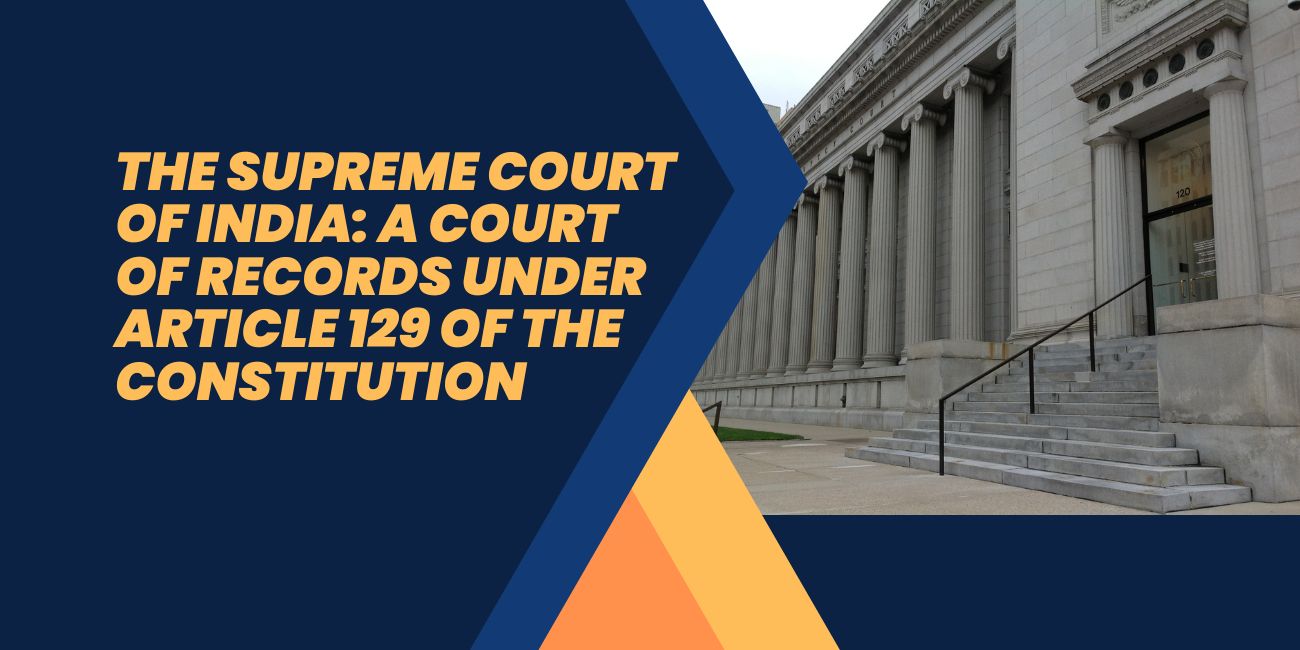The Supreme Court of India: A Court of Records under Article 129 of the Constitution

Introduction
The Supreme Court of India, established under Article 124 of the Constitution, is the highest judicial authority in the country. Its powers and responsibilities are enshrined in the Constitution, making it an essential pillar of Indian democracy. Among its significant roles, the Supreme Court acts as the “Court of Records” under Article 129, preserving the judgments and proceedings for posterity and ensuring transparency and accountability in the Indian judiciary.
Article 129: The Foundation of Supreme Court as a Court of Records
Article 129 of the Constitution of India empowers the Supreme Court to be the “Court of Records.” According to this provision, the Supreme Court holds the authority to maintain an official record of all its judgments, orders, and proceedings. This means that every decision made by the apex court, along with relevant documents and case-related materials, is documented, stored, and made accessible for future reference.
Purpose and Significance
The concept of the Supreme Court as a “Court of Records” serves several essential purposes:
Legal Precedence: By recording its judgments and proceedings, the Supreme Court establishes a system of legal precedence. Precedents are crucial in the Indian judicial system, as they provide guidance for lower courts while deciding similar cases. This consistency in legal interpretation fosters fairness, predictability, and uniformity in the application of law.
Judicial Accountability: The maintenance of records ensures that judges are held accountable for their decisions. By preserving all aspects of a case and its ruling, it becomes easier to scrutinize the reasoning behind a judgment, promoting transparency and reducing the chances of arbitrariness.
Legal Research and Reference: The records maintained by the Supreme Court become valuable resources for legal researchers, practitioners, and scholars. These records are accessible to the public and legal professionals, aiding in-depth analysis, research, and understanding of complex legal issues.
Historical Documentation: The Supreme Court’s status as a Court of Records allows it to contribute to the historical documentation of Indian jurisprudence. The court’s decisions are not just relevant for contemporary cases but also serve as valuable insights into the evolution of Indian law and society over time.
Dissent and Minority Opinions: The court’s records also include dissenting and minority opinions, providing insight into alternative perspectives and promoting the importance of diverse viewpoints in legal discourse.
Challenges and Safeguards
While the concept of the Supreme Court being a Court of Records is crucial, there are challenges that need to be addressed to maintain the integrity of the process:
Data Management: With a vast number of cases and judgments, effective data management becomes essential to ensure the accessibility and organization of records.
Data Security and Privacy: As court records contain sensitive information about individuals and cases, robust data security measures are necessary to safeguard against unauthorized access and data breaches.
Preservation and Digitization: The physical preservation of records is vulnerable to damage, loss, or decay. Emphasizing digitization efforts can aid in preserving records for the long term.
Conclusion
Article 129 of the Constitution of India confers upon the Supreme Court the crucial role of being the Court of Records. By maintaining and preserving records of its judgments and proceedings, the Supreme Court upholds the principles of transparency, accountability, and consistency within the Indian judiciary. The court’s adherence to this role not only serves the immediate purpose of legal precedence but also contributes to the nation’s legal heritage and the growth of a just and equitable society.
If you want to be a judicial officer and are looking for RJS coaching in Jaipur, here, at Jyoti Judiciary we provide comprehensive study material to make your preparation solidified and top-notch. From preliminary mock tests to mains answer writing sessions every material required for clearing the exam is provided. We have separate legal current affairs classes, legal general knowledge, and current affairs classes all in one-time enrolment. Hurry up.









